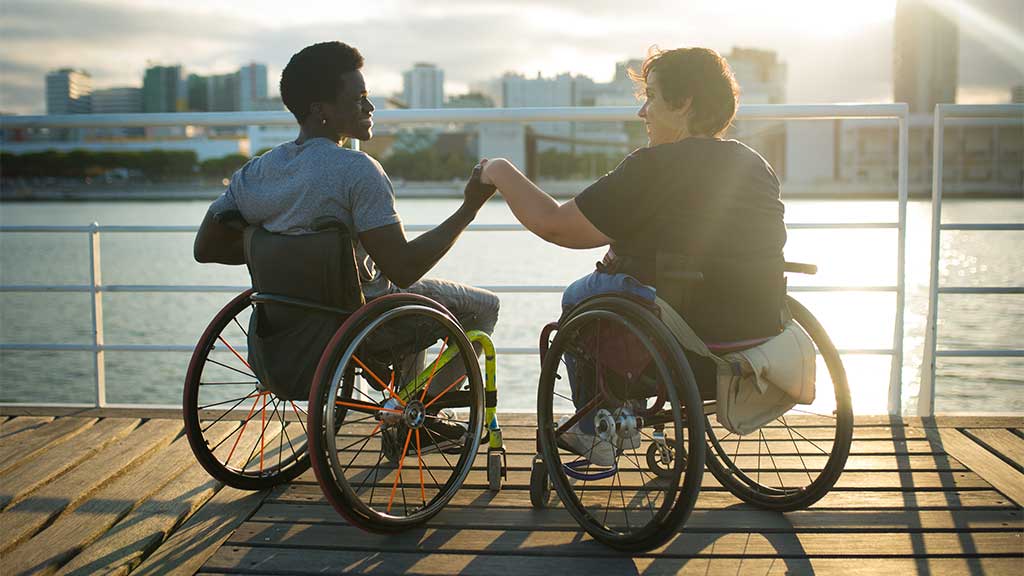If you’re wondering how to get paid for taking care of disabled spouse, the answer is not far-fetched. Nowadays, it’s common to see people taking care of their loved ones. However, most people don’t know that they get paid to take care of a spouse with disability. Spouses can be compensated for their caregiving duties through various organizations and financial sources.
Assuming you hear for the first time that you can get paid for caring for someone you love, you need to know how you can achieve that. The insurance type, income, assets, and state of residence will affect their eligibility. In this article, you will learn everything possible as it regards for getting financial assistance for taking care of disabled spouse.
Who is a Disabled Spouse?
In the medical field, a disabled person has a physical or mental restrain or limitation that hinders them from performing their regular duty or activity. A disabled spouse is a partner in a marriage or civil union who has a physical or mental impairment that substantially limits one or more major life activities. This can include disabilities resulting from injury, illness, congenital conditions, or other factors that impact their ability to perform everyday tasks independently.
Is Caregiver Support Service Important for Disabled Spouse?
Given the increasing number of disabled people, most loved ones would prefer to hire a caregiver support service provider. For those taking care of a sick or disabled spouse, these services offer crucial support.
Support is necessary for caregivers to handle the financial, emotional, and physical strain of taking care of a disabled spouse. Caregiver support programs offer vital support, including counseling, instruction on how to manage the condition of their loved one, and access to financial resources. Here are a few reasons people prefer using a caregiver support service to care for their disabled spouse.
- An understanding of how to manage the circumstance
- Availability of specialized medical supplies or care
- Better mental health because of lower stress levels
- Financial support for long-term care services or medical costs
- Comfort in knowing that more help is accessible if necessary
Disabled Spouse Payment Assessment Process
In 2022, most states offered government assistance for family caregivers, particularly long-term care, to spouse caregivers. What states pay spouse caregivers to take care of their loved ones? All states pay caregivers, but state-by-state variations exist in the requirements. Spouses are not permitted, but family caretakers are. Others do not compensate those who reside in the participant’s house. To take charge of your spouse’s long-term care services, you can apply for a waiver if your state pays for spousal caregivers.
A Medicaid staff member will evaluate your spouse’s circumstances and risks regarding needs, strengths, capacities, and preferences. You’ll likely have to give your spouse a documented list of all the services they need. For instance, taking a shower, cooking, grocery shopping, driving to doctor’s appointments, etc.
How to Get Paid for Taking Care of Disabled Spouse?
Now, to the most important aspect of this write-up: how to get paid for taking care of disabled spouse. You might be wondering how you can make up for the time and work you put into taking care of your Spouse who is disabled. The solution is easy to understand.
Seek financial assistance programs, insurance to support you if you cannot work, and other financial aid options for disabled individuals. Here are some choices for you to consider regarding getting paid for taking care of disabled spouse.
Social Security Disability Insurance (SSDI)
Financial aid is provided if an individual cannot work due to a disability (as defined by Social Security). Their spouse may also receive financial help if they meet the Social Security disability caregiver application criteria. The spouse does not receive more money if they care for their disabled spouse; instead, the help is given to them regardless of whether they do so.
To qualify for Social Security disability caregiver pay benefits, the individual you care for must make less money than a specific amount. Furthermore, they had to have worked for at least five years during the last ten years. Should your spouse fulfill these conditions, you may get SSDI payments as their caretaker, amounting to $2,788 monthly.
Supplemental Security Income (SSI) Program

In addition to helping elderly disabled persons financially, the SSI program relieves family members of some caregiving responsibilities. For disabled persons to be eligible for this program, they must be at least 65 years old, have low assets and income, be wholly or partially blind, or have a medical condition that prevents them from working.
This money is meant to assist with living expenses and the cost of providing care for disabled family members. For married couples, the benefits increase each month; however, this increase is not contingent on one partner taking care of the other.
Veteran Benefits
Should your spouse be a disabled veteran, you can qualify for government financial assistance. Those who care for veterans of the armed forces can benefit from a wide range of services and benefits from the U.S. Department of Veteran Affairs (VA). These services and advantages can lessen the challenging aspects of being a caretaker.
The Dependency and Indemnity Compensation (DIC) program provides benefits to spouses of military personnel who passed away due to illness or injury sustained while the soldier was on duty, up to a maximum monthly payment of $1,704 a month.
Medicaid
Medicaid is another means to get paid for taking care of disabled spouse. Medicaid is a government-funded program that offers financial support to low-income disabled individuals. It can cover the caregiver’s medical costs and long-term care services, making it a valuable tool for individuals caring for a disabled family member.
Medicaid-eligible individuals can get in-home assistance for physical therapy, nursing care, and special medical supplies. A spouse with a disability has a lot more possibilities than these. By looking into these programs and services, you can obtain the funding required to care for your loved one.
Employee Assistance Programs
Disabled spouses’ caregivers can also apply for financial assistance through Employee Assistance Programs (EAPs). This spouse caregiver pay program offers counseling and legal advice to employees and their families. When caring for someone with a disability, they can be a great resource.
By offering tools and emotional support to individuals caring for a family member with a disability, worker assistance programs may lower the stress of providing care. A disabled spouse may require long-term care services or medical costs, which EAPs can assist with paying for.

The knowledge that companies can offer extra assistance, if necessary, gives participants in these programs’ peace of mind. You can get assistance from your employer if you need it or have any queries. Grants and low-interest loans are ways EAPs help with finances.
Long-Term Care Insurance
For getting compensation for taking care of disabled spouse, opt for long-term care insurance. These insurance policies help reimburse spouses for caregiving in some situations, but this depends on the regulations of each policy. For instance, the policy must cover personal care given at home that is not medically necessary.
There would be no need to compensate a spouse if an insurance paid out cash benefits straight to the policyholder, as the spouse would already receive a portion of the benefits. However, a couple may wish to take this route if the policy’s terms specify that payments will only be made to certified caregivers.
This procedure involves several phases. The spouse providing care might have to enroll with their state and obtain a license to perform non-medical in-home care. The person receiving care hires their recently established home care agency.
Following the provision of care, they submit hourly invoices to the long-term care insurance provider for payment. Despite the initial logistical difficulties, this choice can significantly increase a caring spouse’s income.
Joining A Support Group
If you are not looking at how to get paid to be a caregiver for my husband, the next option is to join a support group. The financial and emotional burden of providing care for a disabled spouse can be tremendous. Caregivers of family members with disabilities need to have a support system. Having an encouraging network of people in your life might come in handy when things become challenging and offer practical and emotional support when caring for a loved one.
When caring for a disabled spouse, it can be helpful to have a supportive community. Look for local organizations, services, and support groups to create a robust support system. Support groups are available online and at your neighborhood senior center. Some organizations might even provide resources or cash assistance to help with caregiving costs.
Conclusion
After learning about how to get paid for taking care of disabled spouse, it’s time to consider which option would work best for you and your family in terms of managing caregiving expenses. Medicaid remains the best method for family members to get paid for caregiving. The homebound spouse must be eligible for Medicaid due to low yearly income, blindness, or SSI. Medicaid allows veterans to hire a spouse caregiver. Those who do not meet the Medicaid requirements might contact state or local groups to inquire about additional options.


![Self-Care for Caregivers [Tips from Experts]](https://caregivercourses.net/wp-content/uploads/2024/07/Self-Care-for-Caregivers-Tips-from-Experts-300x169.jpg)


